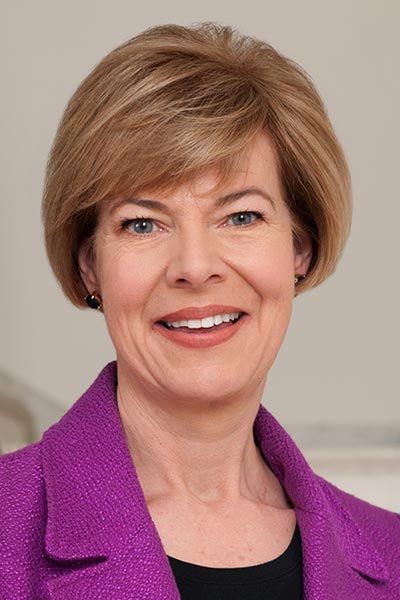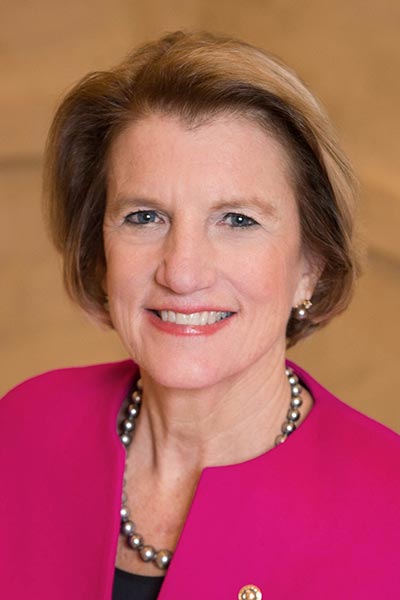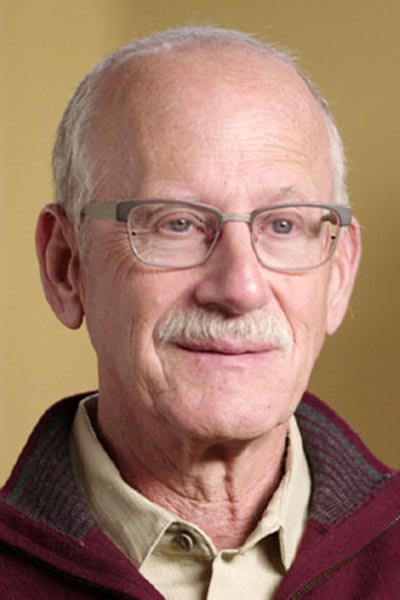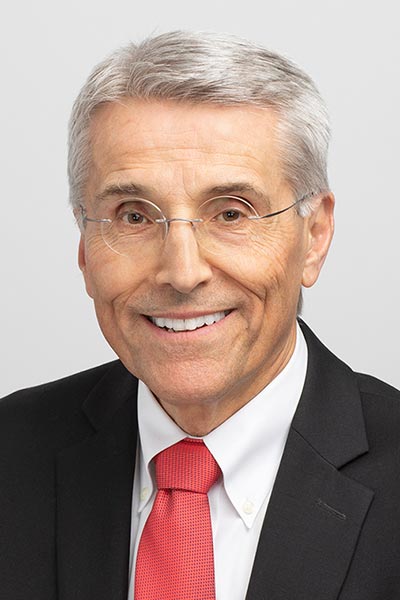AACR Annual Meeting to honor champions of cancer research with public service awards
The American Association for Cancer Research (AACR) will present several awards in recognition of contributions from leaders in government and the advocacy community during the AACR Annual Meeting 2025.
The recipients will be recognized on Sunday, April 27, during the meeting’s Opening Ceremony, which begins at 7:45 a.m. CT in Hall B1 of McCormick Place North (Level 3).
For the most up-to-date information on session dates, times, and locations, check the Annual Meeting App and Online Itinerary Planner.
AACR Distinguished Public Service Awards
Senator Tammy Baldwin (D-Wisconsin)

Baldwin is being recognized for her national leadership in advancing cancer prevention and treatment and her deep commitment to expanding access to screenings, reducing health disparities, and strengthening the biomedical research enterprise. As ranking member of the Senate Labor, Health and Human Services, Education, and Related Agencies Appropriations Subcommittee, she plays a critical role in shaping federal funding for the National Institutes of Health (NIH) and other key health programs.
In the 118th Congress, Baldwin introduced the bipartisan Screening for Communities to Receive Early and Equitable Needed Services (SCREENS) for Cancer Act to reauthorize and strengthen the National Breast and Cervical Cancer Early Detection Program. The bill aimed to ensure that underserved women have access to lifesaving cancer screenings and diagnostic services. More recently, she hosted a Senate forum examining the ongoing instability at NIH and its implications for research institutions and patients nationwide.
Baldwin continues to be one of the most consistent and impactful champions of NIH and the cancer research community on Capitol Hill, as she has been throughout her congressional career.
Senator Shelley Moore Capito (R-West Virginia)

Capito is being recognized for her outstanding advocacy for cancer research, early detection, and patient care, particularly in childhood cancer. As chair of the Senate Labor, Health and Human Services, Education, and Related Agencies Appropriations Subcommittee, she has played a key role in securing NIH funding to advance cancer research.
She co-authored the bipartisan Childhood Cancer Survivorship, Treatment, Access, and Research (STAR) Act, the most comprehensive childhood cancer legislation ever passed, directing over $120 million to pediatric cancer research and survivor support. Capito also cosponsored a bipartisan resolution designating September 2024 as Childhood Cancer Awareness Month, aiming to highlight the critical need for continued research and support for affected families.
Capito’s advocacy is deeply personal. Her husband lost his grandmother, mother, and father to cancer, further fueling her commitment to ensuring more families have access to early detection and innovative treatments.
Larry Saltzman, MD

Saltzman is a retired physician and former executive research director for the Leukemia & Lymphoma Society. He is being recognized for his exceptional advocacy for NIH funding. Saltzman was diagnosed in 2010 with chronic lymphocytic leukemia, a type of cancer that becomes resistant to treatment and is generally not curable. At the time of his diagnosis, he was given five to eight years to live. Because of innovations in treatment made possible by NIH funding, he has surpassed this estimate by seven years.
Saltzman shared his story in the AACR Report on the Impact of COVID-19 on Cancer Research and Patient Care in early 2022. More recently, he published an op-ed in the Sacramento Bee and spoke with policymakers at Baldwin’s Senate forum about the importance of NIH-funded clinical trials, especially for patients with incurable cancer who need advances in treatment to outpace the progression of their disease.
Saltzman’s powerful personal story is a moving reminder of what is at stake when federal funding for cancer research is threatened. As he said in his congressional testimony last month:
“I speak here today not only for myself, but for every patient who has ever held out hope that research would buy them another year—or another decade. Without robust, sustained, and predictable funding from the NIH, those bridges to the next treatment won’t be there when patients need them.”
AACR Enduring Impact Award for Transformative Service to Cancer Science and Medicine
Richard Pazdur, MD

Pazdur is the director of the U.S. Food and Drug Administration (FDA) Oncology Center of Excellence (OCE), established in 2017. He is being recognized for his profound contributions to cancer science and medicine throughout his impressive 25 years at the FDA, where he has led an era of progress that has improved outcomes for countless patients with cancer. This award celebrates the tremendous efforts of Pazdur and his team to expedite the development of novel cancer therapeutics and to establish integrated regulatory approaches that have enhanced the cross-center coordination of oncology product clinical reviews.
Pazdur joined the FDA in 1999 as director of the Division of Oncology Drug Products, in the Center for Drug Evaluation and Research. In 2005, he led the consolidation of divisions that reviewed drugs and therapeutic biologics for cancer and hematologic diseases into the Office of Hematology and Oncology Products (OHOP). In 2019, OHOP was reorganized to become the Office of Oncologic Diseases (OOD). Pazdur serves as acting director of OOD.
During his tenure at the FDA, Pazdur has been at the forefront of helping the agency adapt to and usher in the era of modern cancer therapeutics, including targeted therapies, immune checkpoint inhibitors, and adoptive T-cell therapies. His leadership has contributed to many more treatment options for patients with cancer. Indeed, more than 200 cancer drugs have been approved by the FDA in the past 25 years.
By bringing together cancer experts from across the FDA under the auspices of OCE, Pazdur has improved communication, efficiency, and productivity in the review and regulation of novel cancer therapeutics for the benefit of researchers and drug developers, oncologists, and, most importantly, patients. Programs and projects spearheaded by OCE include Project Optimus, an initiative to reform the dosage optimization and dosage selection paradigm in oncology drug development, and Project Livin’ Label, an educational initiative that aims to foster broad understanding of the associated oncology product label and increase awareness of recent oncology drug FDA approvals in the cancer community, among many others.
Pazdur has received numerous awards and honors throughout his career. In 2015, he was recognized with the AACR Distinguished Public Service Award. In addition, he has received the Regulatory Affairs Professionals Society Patient-Centered Health Award (2021), the University of Chicago Cancer Research Foundation Simon M. Shubitz Cancer Prize and Lectureship (2020), the FDA Alumni Association Harvey W. Wiley Award (2019), recognition as one of OncLive’s Giants of Cancer Care (2019), the Reagan-Udall Foundation Innovations in Regulatory Science Award for Leadership (2018), the National Organization for Rare Disorders Rare Impact Award (2018), the American Society for Clinical Pharmacology and Therapeutics Gary Neil Prize for Innovation in Drug Development (2018), recognition from Bloomberg as one of The Bloomberg 50 (2017), inclusion on Massachusetts General Hospital Cancer Center’s “the one hundred” list (2016), recognition from Fortune magazine as one of the 50 World’s Greatest Leaders (2015), the LUNGevity Foundation Face of Hope Award (2015), the National Coalition for Cancer Survivorship Public Service Leadership Award (2015), and the American Society of Clinical Oncology Service Recognition Award (2009).
Prior to joining the FDA, Pazdur was professor of medicine at The University of Texas MD Anderson Cancer Center in Houston, Texas. Before that, he served on the faculty of Wayne State University in Detroit, Michigan. Pazdur earned his undergraduate degree at Northwestern University and medical degree at the Loyola University Chicago Stritch School of Medicine. He has published more than 800 articles, book chapters, and abstracts, as well as two medical oncology textbooks.
More from the AACR Annual Meeting 2025
View a photo gallery of scenes from Chicago, continue the conversation on social media using the hashtag #AACR25, and read more coverage in AACR Annual Meeting News.

